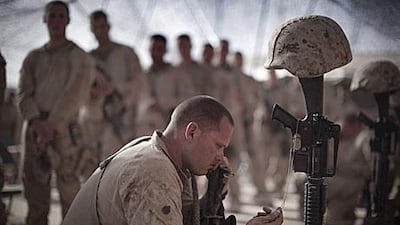WASHINGTON // As a major international summit on the future of Afghanistan begins in Bonn today, an underlying issue facing the US delegates will be a simple question - what can Washington, which has taken the lead on the country, hope to accomplish there with fewer troops, less money, and less time?
US objectives in Afghanistan are far more modest than they were in the months following the September 11 terror attacks, when the West hoped to replace the Taliban with a secure democracy.
After years in which the war was overlooked and underfunded, in 2009 the US president, Barack Obama, focused the "war of necessity" on the threat from Al Qaeda and on enabling Afghanistan to fend off its enemies for itself.
Yet even US goals for Afghanistan today, which include providing a modicum of security, making progress against endemic poverty and improving weak, corrupt governance, are in question as western nations move to curtail their role in a war that most officials believe cannot be won on the battlefield.
The US "has yet to present a credible and detailed plan for transition that shows the US and its allies can achieve some form of stable, strategic outcome in Afghanistan that even approaches the outcome of the Iraq War", Anthony Cordesman, a security analyst at the Center for Strategic and International Studies, wrote recently.
"Far too many US actions have begun to look like a cover for an exit strategy from Afghanistan."
The US military and diplomatic blueprint, especially for the next two years as foreign troops hand over control to local forces, takes centre stage ahead of today's summit in the German city.
The Afghan president, Hamid Karzai, and the US secretary of state, Hillary Clinton, are among those attending.
The Bonn meeting will seek to chart a course for Afghanistan after the Nato withdrawal in 2014, but a boycott by Pakistan over the deaths of 24 of its soldiers in a Nato air raid a week ago has dealt a blow to already fragile hopes for an action plan.
Pakistan is seen as vital to any prospect of stability in the war-ravaged country a decade after US-led forces deposed the Taliban, who had offered safe haven to the Al Qaeda leader, Osama bin Laden.
US officials link the nation's long-term presence in Afghanistan, which could include bases and a major diplomatic footprint even after most foreign combat troops go home at the end of 2014, to defending US national security.
But a series of high-profile attacks in recent months, including an assault on the US embassy in Kabul and the assassination of the former Afghan president, Burhanuddin Rabbani, who was leading peace talks with militants, rattled the narrative of improving security.
"We have important work to do inside Afghanistan. I will say that a great deal of progress is being made. Insurgents have been under increasing pressure," the Pentagon spokesman, George Little, said at the weekend. "The enemy remains dangerous and they are capable of violence, as we have seen, regrettably."
Many worry that an array of militants, in the absence of enough foreign troops and an adequate improvement in local security forces, would plunge Afghanistan back into major violence.
"If you don't deal with that, then where are you going to be five years from now?" asked Jeffrey Dressler, a security analyst at the Institute for the Study of War in Washington.
"You could have even a greater sanctuary and safe haven [for militants] than you had before 9/11."
Military commanders are now drawing up plans for how they will stretch a shrinking force to match that threat.
Underlying Mr Obama's plans is the new fiscal reality of the US government, mired in debt and facing big budget cuts.
These fiscal pressures are compounded by Congress's mounting exasperation with what they see as Mr Karzai's erratic behaviour and growing recognition that Pakistan may never cooperate as desired against militants. Ahead of the summit, Mr Karzai accused Pakistan of undermining all negotiations with the Taliban.
"Up until now, they have sadly refused to back efforts for negotiations with the Taliban," Mr Karzai told Der Spiegel weekly, in comments due to be published today.
As a neighbour with historic ties to the Taliban, Pakistan is considered integral to ending the decade-long conflict, but experts say its boycott matters less now that already modest expectations for Bonn have been dramatically curtailed.
Diplomats had hoped the conference would help broker peace with the Taliban, but the September assassination of Mr Rabbani derailed those efforts.
As the troop withdrawal looms, US officials are pressing ahead with efforts to broker a deal outlining the long-term US-Afghan relationship, even though night raids and other issues remain sticking points.
The deal will include a commitment in principle to a US military presence after 2014, which will focus on supporting Afghan forces and on targeted operations against militants. US officials insist Washington will not walk away.
One senior official said the goal of the Bonn conference and an earlier one in Istanbul this year was "to send a message to the Taliban and anybody else that, actually, international engagement and investment in Afghanistan is not over".
* Additional reporting by Agence France-Presse

